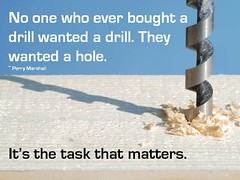This is a reply to a healthy ‘ring’ of posts by Mark Drechsler (Learning technologies – should the tail wag the dog? – an excellent string of replies growing there!), David Jones (The dissonance between the constructivist paradigm and the implementation of institutional e-learning) and Mark Smithers (e-learning at Universities: A Quality Assurance Free Zone?). I invite you to read these excellent posts to get a better picture. In a nutshell, they collectively wonder that old nut in many guises and variations: “Why aren’t educators using progressive pedagogical approaches by using technologies that lends themselves so well to such approaches?”
First, let’s clear with some nomenclature. Here, let’s call constructivism (mentioned by these guys) and the likes as ‘progressive’, and ‘results of outdated policy changes that have calcified into conventions’ (Nehring) as ‘traditional’. One could drive a truck through this argument, I know! David explains this continuum nicely, so does Alfie Kohn (Progressive Education; Why It’s Hard to Beat, But Also Hard to Find).
Similarly, learning theories (the various -isms) are useful, but frankly oft overrated, mis-understood edu-psych discourses with shades of purism. In sporting parlance, every -ism is a ‘well-meaning’ club with its main players and legions of fans. It thrives on membership & wins against other -isms, sometimes to the detriment of the game itself. While perhaps fonder of a particular theory on a dynamic continuum, a wise educator has to be part-constructivist, connectivist, traditionalist, instructionist or other -ist, strategically. Let’s not get too stuck on purist theory but take things with a grain of pragmatic salt.
And this is getting to the heart of the matter, for me at least: Educators will mostly use pedagogical approaches which align with the answer(s) to the question(s): What is the primary purpose of education? What are the priorities? What are we here for?
Importantly, they will NOT always align with their own answers to these questions, but also answers of the school/uni they work at, parents, students, and the larger society the school, and themselves, are a part of. These can be poles apart but need to be upheld, negotiated in different spaces and different times. No glib universals and binaries please!
Educators bring their own passions and priorities to technologies they use in their work. Take Moodle for example. An educator with a ‘progressive’ mindset will relish wikis, forums and collaborative tools in Moodle, her colleague might puke a bunch of files and worksheets in Moodle (thanks for that turn of phrase KerryJ 😉 ) because they are a convenient electronic version of ‘have what kids need to know’, another one may love the intricate ‘drill and kill’ possibilities of Quiz … you get my drift, surely (and they are all ‘using Moodle’!).
Now, all this gets tempered with, for example:
- what students’ preference may be (I’ve heard “no more Moodle forums Sir, can’t we just talk about it in class” after an enthusiastic Moodle overdose on my part),
- what schools allow (‘Allowing YouTube? Are you nuts? How about some teaching instead?” – oh yes, heard that one!),
- what parents want (“I just want my little Johnnie to get the best exam marks and your job is to help him do that” – yep, many times),
- what the Prime Minister is touting on TV (“schools that don’t perform will have their funding cut…” – and I thought bullying was a thing to get rid of in schools, silly me)
A glorious mess of tensions and priorities to negotiate!
I’ve tried to put things in a hopelessly inadequate graph. I cannot stress enough (again) that people move through this graph at different times for different purposes. But here it is…

Now, I do work for the makers of one (and love it!), but for all the bells and whistles, it’s a bit pointless calling a piece of software ‘progressive’ (or ‘traditional’ for that matter). Makes about as much sense as calling say leeches in medicine ‘primitive’ . While certainly built with ‘progressive’ use in mind, Moodle (for example) is only as ‘progressive’ as its use. And I assure you it is painful for Moodle HQ to watch a Ferrari built to facilitate ‘progressive’ approaches, driven so many times in the first gear and without considering a change …
I answer Mark’s (paraphrased) question “Are we happy with just using technology or are we only happy using technology in a particular, progressive way?” with a question: Will/do these ‘progressive’ approaches fail to take hold because we didn’t/don’t use technology at hand in a particular way?
Beware getting stuck in the reflexive cause-effect conundrum (in plain English – chicken or egg?) but it is bloody important to ask.
Reference:
James H. Nehring, “Progressive vs. Traditional: Reframing an Old Debate,” Education Week, February 1, 2006, p. 32.








